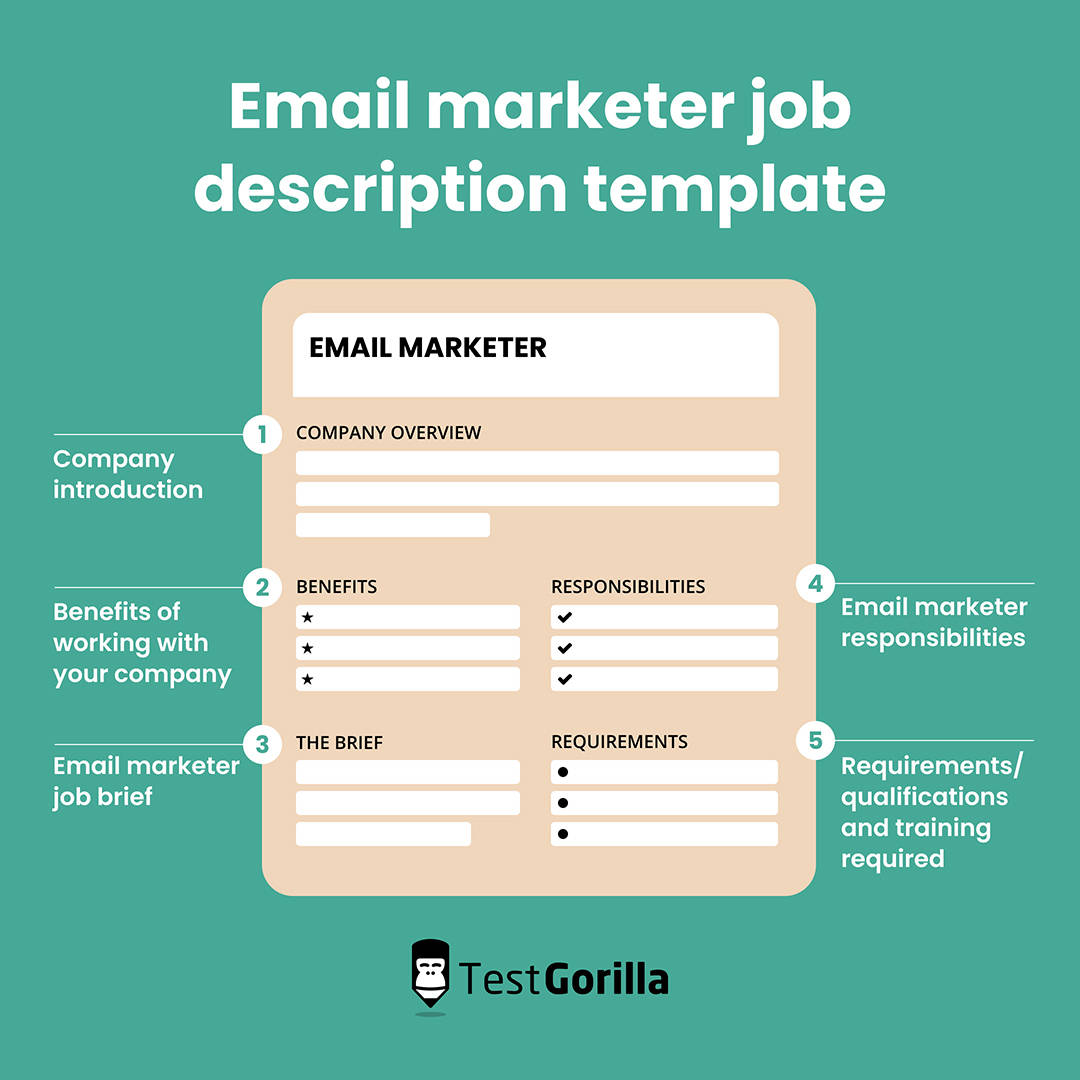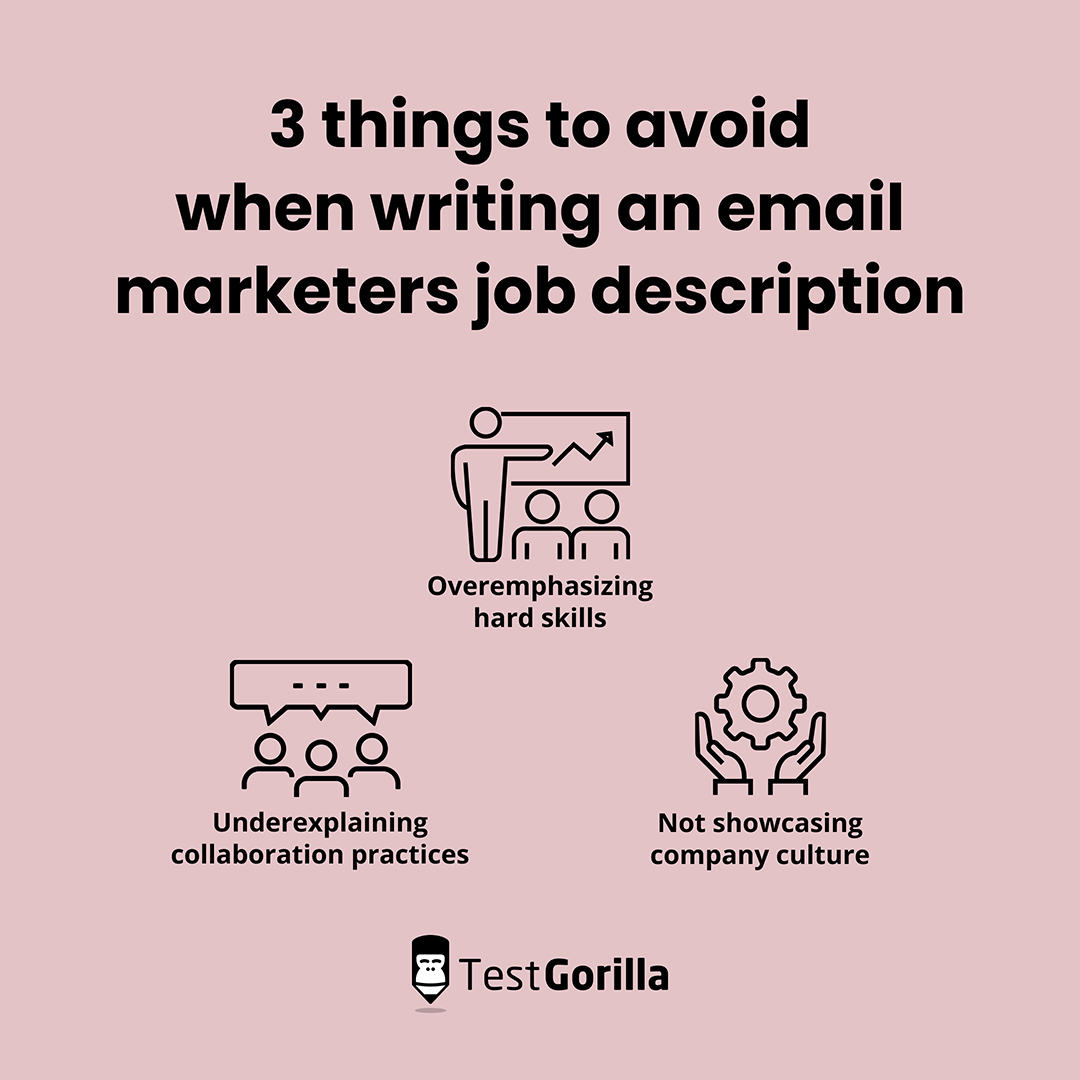Email marketers are an invaluable asset to any organization, whether you’re targeting consumers or companies. They write persuasive copy, engage customers, and help bring in new business.
It’s vital to nail the early recruitment stages, starting with your email marketer job description. It should feature a mix of hard and soft skills while providing enough detail to attract suitable applicants. Not getting this balance right could mean hiring inexperienced or underqualified candidates who end up negatively impacting your turnover.
Our guide is here to help, offering you a customizable job description template, top email marketer skills to look for, and best practices to follow.
Table of contents
- What is an email marketer?
- Key skills to look for in email marketers
- How to write an effective email marketer job description
- Email marketer job description template
- Three things to avoid when writing a job description for email marketers
- Next steps: Attracting and assessing email marketer candidates
- FAQs
- Find your next email marketing hire with TestGorilla
What is an email marketer?
An email marketer is a marketing team member specializing in email campaign design and execution. While their specific to-do list can vary, the role usually centers around campaign planning, audience research, copywriting, engagement tracking, and stakeholder collaboration.
A proficient email marketer will help you achieve targeted goals, such as increasing your customer retention rate, generating website traffic, and turning passive contacts into sales leads.
Key skills to look for in email marketers
Email marketers are multi-skilled professionals who balance analytical and creative thinking to engage audiences. Here’s the core email marketing skill set to look for:
Research: Understanding customer needs and competitors’ strategies.
Collaboration: Gathering input from relevant stakeholders, such as content designers and project managers.
Copywriting: Crafting coherent, eye-catching, and well-structured email copy.
Email campaign planning: Setting campaign targets, establishing high-level messaging, and tracking timelines.
Time management: Balancing competing priorities to hit campaign deadlines.
Email marketing software: Using technical features efficiently, such as email scheduling and automation.
Customer segmentation: Segmenting email lists strategically to personalize communications.
Email testing: Using techniques such as A/B testing to improve email copy and design.
Data analysis: Tracking and interpreting email metrics, like click and open rates to continually improve campaign performance.
Critical thinking: Defining and solving problems in a logical, result-driven way.
Attention to detail: Spotting mistakes and improvement opportunities across visual and textual content.
Empathy: Putting themselves in the customer’s shoes to create compelling content.
The best insights on HR and recruitment, delivered to your inbox.
Biweekly updates. No spam. Unsubscribe any time.
How to write an effective email marketer job description
Attract high-quality email marketing applicants by following these straightforward best practices.
Define the role’s must-haves
While email marketers specialize in just one channel, requirements vary from job to job. So, to attract well-suited candidates, detail the absolute must-haves of your role.
For example, email marketers may not require prior industry knowledge, but they may need solid experience using A/B testing or specific marketing software, like Hubspot. Make a clear distinction between required and desired skills when preparing your job description.
Clarify existing processes
Many email marketers start new roles without knowing whether they’re expected to follow established processes or build them from scratch. These two expectations require different skill sets, so clarify your processes from the get-go.
For example, if you don't yet have email marketing systems in place, specify that the new starter must “be willing to trial and set up new email marketing practices.” Otherwise, look for someone who can “use established campaign guidelines and rapidly adapt to our technical platforms.”
Keep wording clear and simple
Resist the urge to pepper your job description with ambiguous expressions, like “marketing ninja” and “genius communicator.” These phrases not only make your requirements unclear but may also deter certain skilled individuals who don’t identify with the language used.
Instead, use simple and explicit language, such as “possessing advanced marketing knowledge” and “being able to communicate with stakeholders across seniority levels.”
Email marketer job description template
Get a head start by using our email marketer job description template. Ensure you customize it to fit your role specifications.
Company introduction
Briefly describe your company’s mission, values, products, and target audience. Give the email marketing applicant an idea of what they’ll be promoting and to whom. In addition, make the role attractive to applicants by emphasizing your unique company culture, the benefits of working with your team, and job perks.
Email marketer job brief
[Company name]
Job Title: [For example, Email Marketing Assistant, Email Marketing Manager]
Reports to: [For instance, Senior Marketing Manager, Marketing Director]
Position type: [Full-time, part-time, or temporary cover]
Location: [Remote, hybrid, or on-site]
[Salary and benefits information]
Email marketer responsibilities
Research and segment different customer groups, such as [target audience examples], according to campaign needs.
Plan email campaigns, including outlining timelines, quantitative and qualitative targets, and high-level messaging.
Ensure timely and effective collaboration with internal and external stakeholders, including your line manager, visual designers, proofreaders, project managers, and photographers.
Integrate copywriting expertise, critical thinking, and attention to detail to craft compelling conversion-optimized emails.
Utilize our marketing and CRM platforms to design, streamline, and automate emails, including Hubspot and Salesforce.
Clean up email lists regularly, including archiving non-existing email addresses and updating customer details.
Leverage new technologies to produce better emails, such as Chat GPT and others.
Use creative and critical thinking to compose persuasive email subject lines and CTAs.
Follow our established email campaign guidelines and identify improvements to the process according to new technologies and trends, as needed.
Use A/B testing and other methods to continually improve email performance.
Track and analyze engagement metrics, such as click and open rates, and test hypotheses to improve engagement.
Produce reports detailing email campaign successes and learnings.
Closely follow top-level business targets, including increasing customer retention and sales lead conversion.
Communicate efficiently with product owners to evaluate email traffic to our website, app, and social media.
Stay compliant and up-to-date with local data protection and privacy laws.
Requirements/qualifications and training required
A professional certificate or bachelor’s degree in a relevant subject, like marketing, management, or copywriting (or equivalent work experience)
More than one year’s experience in email marketing
CRM and marketing software experience desired
Three things to avoid when writing a job description for email marketers
It’s easy to lose sight of subtle actions that help you land ideal email marketing candidates. Here are some common mishaps you should avoid.
1. Overemphasizing hard skills
Neglecting soft skills in your job description may lead to hiring a talented email marketer with very poor collaboration traits.
So, give hard and soft skills equal weight in your job description. For instance, instead of saying “uses copywriting skills to craft conversion-focused emails,” say “uses copywriting skills and collaborates effectively.”
2. Underexplaining collaboration practices
Experienced email marketers favor job descriptions that clarify which team members they’ll be collaborating with.
Who is providing specialist content? Who is setting campaign targets? Who approves email copy? These are some examples of questions you should answer in your job description. If you don’t, applicants could assume they’ll be fulfilling extra responsibilities.
3. Not showcasing your company culture
Email marketing can often be an intense desk-based role, so experienced candidates will be drawn to an engaging company culture.
Emphasize how employees can get involved in company activities, like team building or volunteering days, and what employee support resources are available. Otherwise, qualified applicants could assume it will be a monotonous experience.
Next steps: Attracting and assessing email marketer candidates
Once your email marketer job description is polished and published, your next challenge is to identify top-ranking candidates.
TestGorilla’s scientifically validated tests can be combined to create bespoke assessments for email marketing applicants. You’ll then have a skills-based, score-oriented ranking of your top candidates. Alongside email marketing interview questions, online assessments help you make data-driven, bias-free screening decisions.
Consider including the following tests in your email marketing candidate assessment:
Role-specific tests, like email marketing and branding strategy
Cognitive ability tests, such as attention to detail and critical thinking
Personality tests, like the Enneagram or Big 5 (OCEAN)
Software tests, like email skills (Microsoft Outlook)
Find out more about how to assess marketing skills.
FAQs
What does an email marketer do?
An email marketer writes and sends emails to an organization’s target audience. They produce various forms of content, from educational to promotional. They also collaborate with other team members to ensure that email content is accurate and informative.
Is email marketing dying?
Email marketing isn’t dying, though it’s most effective when used alongside other mediums, such as social media and content marketing. You can use it to increase customer conversion and retention, so long as you nurture an engaged email list and send relevant information and requests.
Find your next email marketing hire with TestGorilla
A tailored, comprehensive job description is the first step to attracting email marketing candidates who match your role and company culture. Using the template and tips outlined in our guide enables you to create a top-notch job description and jumpstart your selection process.
An effective next step is evaluating your candidates’ skills and traits using online assessments. Explore TestGorilla’s test library and combine job-related, cognitive, and personality tests to create a bespoke email marketer assessment.
Want to find out more? Take a TestGorilla product tour today.
You've scrolled this far
Why not try TestGorilla for free, and see what happens when you put skills first.
















